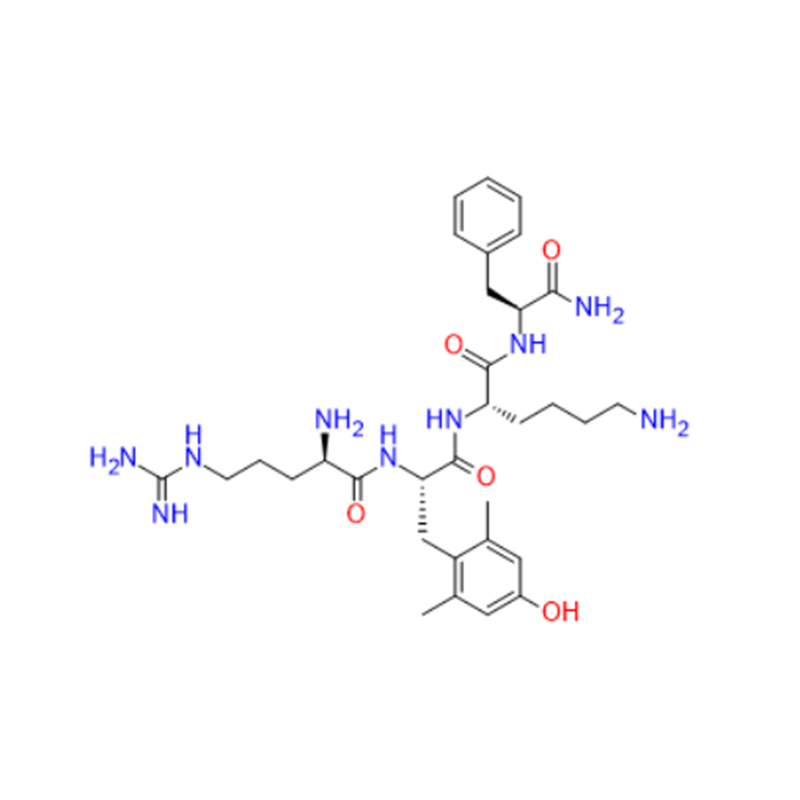Cardiovascular disease, which is the leading cause of death of non-communicable diseases, is largely an aging-related disease. With the increase of age, the heart, as a blood pumping organ, will age, and its ability to relax and contract will decline, and it will gradually be unable to pump blood to the whole body, which will eventually lead to heart failure of patients and seriously affect people's healthy life.
The aging of the heart is characterized by the decrease of cardiac contractility (cardiac function), which will be accompanied by the decrease of protein abundance and the changes of protein's post-translation modification.



SS-31 peptide is a cardiolipin peroxidase inhibitor and a mitochondrial targeting peptide. It can improve the function of left ventricle and mitochondria. SS-31 peptide can alleviate mitochondrial dysfunction and oxidative damage in human trabecular meshwork cells. It can prevent iHTM and GTM(3) cells from sustained oxidative stress induced by H2O2.
SS-31 is a mitochondrial targeting anti-aging substance, which has been proved to be effective in restoring the heart function of aged mice. It is a synthetic tetrapeptide combined with mitochondrial inner membrane, which can improve mitochondrial function, reduce the production of reactive oxygen species ROS, reduce the level of pro-inflammatory factors and mainly enhance the diastolic function of the heart.
Firstly, comparing young mice with old mice, scientists found that the abundance of mitochondrial proteins is particularly affected by aging, including mitochondrial signal transduction pathway, proteins related to oxidative phosphorylation pathway that produces energy, and proteins related to SIRT signal transduction pathway related to energy metabolism in mitochondria. In addition, the essential proteins troponin and tropomyosin, which directly mediate myocardial contraction, are also obviously affected by aging. These are closely related to cardiac function. Secondly, when considering the influence of SS-31 treatment, the researchers found that the protein abundance of the treated old mice did not seem to be consistent with that of the young group, but they all showed the recovery of the inactivation pathway with aging, such as the protein abundance of the tricarboxylic acid cycle, the main pathway of energy production in the body, which really recovered to a great extent, making the old mice younger. This means that SS-31 is especially effective for the changes of energy metabolism caused by heart aging. The exploration of protein abundance came to an end, and then researchers turned their attention to the changes in protein's post-translation modification during the aging process, and specifically chose the most common post-translation modification in protein, which is most related to the heart-acetylation modification. There may be two changes in acetylation modification. First, because the acetylation of mitochondrial protein will increase with age, resulting in mitochondrial dysfunction, and the mitochondrial content of the heart is very high, so the whole heart may have high acetylation accumulation while the cardiac function declines; Second, there will be the loss of normal acetylation of specific residues in the aging process, which will lead to the failure to play its normal function. Researchers have enriched the acetylated peptides in the heart (which can be simply understood as small units used to form protein). There are still differences in the acetylation status of heart proteins between the young group and the old group, but it is not as obvious as protein's abundance. Then they also further explored which proteins this change in acetylation status can be specific to. Finally, the researchers once again linked the systolic and diastolic ability of the heart and found 14 acetylation sites related to the diastolic ability of the heart, and all of them were negatively correlated. At the same time, two sites related to cardiac contractility were also found. This means that the change of contractility during aging may be regulated by the acetylation state of heart protein.
We are a polypeptide manufacturer in China, with several years of mature experience in polypeptide production. Hangzhou Taijia Biotech Co., Ltd. is a professional polypeptide raw material manufacturer, which can provide tens of thousands of polypeptide raw materials and can also be customized according to needs. The quality of polypeptide products is excellent, and the purity can reach 98%, which has been recognized by users all over the world.Welcome to consult us.






